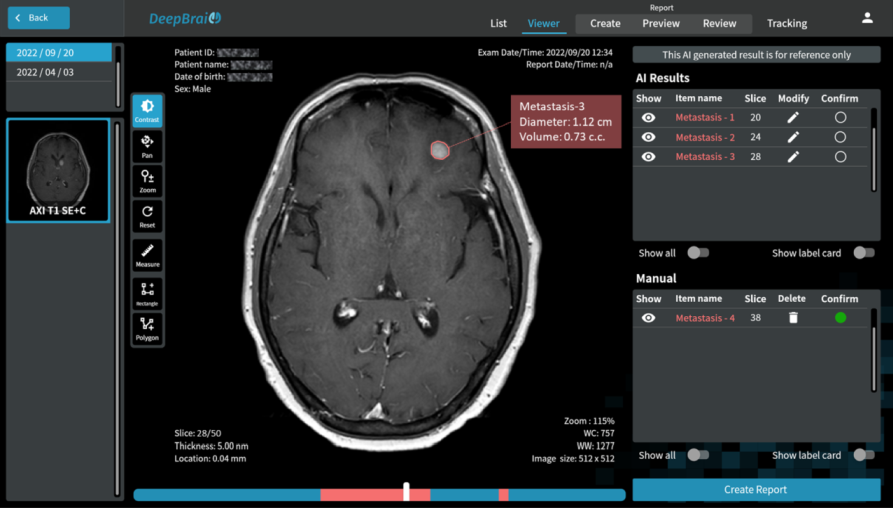Call to Action: confirm leading edge medical AI technology improves radiosurgery clinical workflow

To distinguished medical professionals,
We would like to request your assistance with an AI project designed to make radiosurgery more precise and accessible. Participants will have access to leading edge AI technology which seeks to revolutionize radiosurgery procedures for patients, clinicians, and institutions. This project is initiated by Taiwan AI Federated Learning Alliance (TAIFA) and supported by Taiwan AI Labs.
To start, we propose each institution participating in the project verify that DeepMets makes the radiosurgery clinical workflow more efficient. We anticipate the benefits of this technology will include:
- Faster clinical workflow
- Increased cost-effectiveness of procedures
- Improved accuracy and precision in diagnostics
DeepMets is part of the DeepBraiM family of AI-powered tools. DeepBraiM is designed to aid the detection of various brain tumors and other abnormal neurological conditions to facilitate treatment workflow. DeepMets was developed by Taiwan AI Labs and Taipei Veterans General Hospital. It is Taiwan FDA approved. DeepMets can quickly identify brain metastasis to aid clinicians and radiologists in detecting brain metastases on magnetic resonance images (MRI).
DeepMets works by analyzing MRI and quickly identifies and contours the locations of brain metastasis (between 4mm to 40mm), typically within minutes for an MRI examination. Reports in both PDF and RTSS format are generated for review and validation by the clinician or radiologist. This report can be used to create a treatment plan and evaluating treatment effects.
In addition to the clinical implementation of DeepMets, the technology offers the benefits of Federated Learning (FL) and Federated Validation (FV). FL, also known as decentralized learning, is a machine learning technique in which many institutions first train their individual local AI model with their local dataset. After the local AI model has been trained, this model is shared with other institutions in a manner that protects patient privacy, to collectively develop a global AI model that has effectively been trained by multiple institutions, using multiple datasets.
FV, also known as decentralized validation, is where an institution’s local AI Model can be validated against available datasets that have been collected as part of the FL efforts. This allows individual institutions to verify that their specific AI model is correct in its inference capabilities by using a diverse dataset provided by multiple institutions. As with FL, patient privacy is protected, as the dataset information is not shared between institutions during FV. The requesting institution receives only the results of the FV.
The primary objective of this project is to verify the suitability of DeepMets for use in clinical scenarios. The expectation is that DeepMets will increase the efficiency of the clinical teams in designing the treatments through automating the identification of brain metastasis. This, in turn, offers improved benefits to the institution and patients in the following ways
- The treatment team members will spend less time on each procedure, reducing the time commitment and stress experienced by both the patient and the medical professionals;
- Treatment decision will become faster, less costly, and more accurate for patients in need of treatment;
- As workflow efficiency increases with DeepMets, the institution ultimately saves on operating costs.
By supporting this project, you will be part of a team of pioneers that aims to make medical service more accessible to everyone.
To join this project, please visit this web link:
☞ Click Here for International Collaborators
or Scan the QR code
Thank you for your time and consideration.
Sincerely,

Wan-Yuo Guo, M.D., Ph.D.
Head of Medical Solutions, Taiwan AI Labs
Professor, School of Medicine, National Yang Ming Chiao Tung University, Taiwan
Emeritus Radiologist, Taipei Veterans General Hospital, Taiwan


